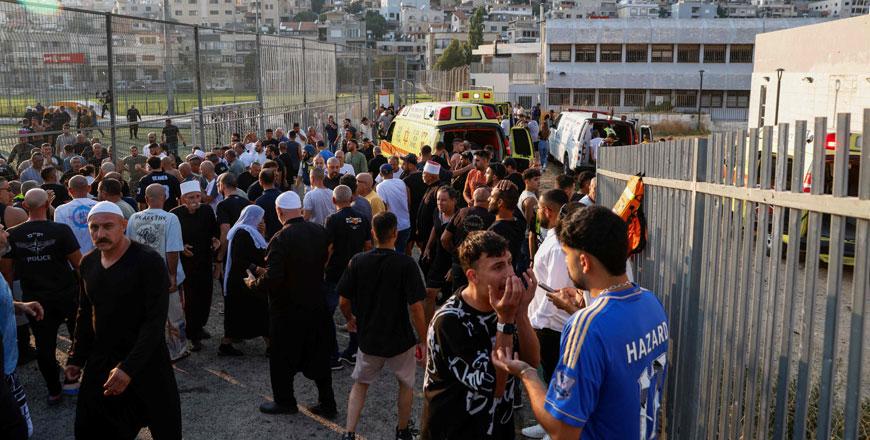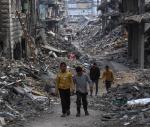You are here
Source close to Hizbollah says Israeli strike hits southern Beirut suburb
By AFP - Jul 30,2024 - Last updated at Jul 30,2024

Smoke rises from a site targeted by Israeli shelling in the southern Lebanese border village of Khiam on July 30, 2024, amid ongoing cross-border clashes between Israeli troops and Hezbollah fighters (AFP photo)
BEIRUT — A source close to Lebanon's Hizbollah told AFP an Israeli strike hit its stronghold in Beirut's southern suburbs, days after Israel said it would retaliate over a deadly attack on the annexed Golan Heights blamed on the group.
"Israel has struck the Beirut southern suburb," the source said, requesting anonymity, with witnesses telling AFP they heard a loud bang and saw plumes of smoke rising.
Lebanon's state-run National News Agency said "an enemy raid targeted near Hizbollah's Shura Council," the powerful Lebanese group's decision-making body in Beirut's Haret Hreik suburb.
An AFP photographer on the ground said the last floor of an eight-storey building was hit and that ambulances had converged at the site of the strike. On Saturday, a strike on the Druze Arab town of Majdal Shams in the Israeli-annexed Golan Heights killed 12 children.
It was blamed by Israel and the United States on Lebanon's Hizbollah, although the Iran-backed group has denied any connection to the attack.
During a visit on Monday to Majdal Shams, Israeli Prime Minister Benjamin Netanyahu vowed a "severe response", raising fears yet again that the Gaza war could spill over into a wider regional conflagration.
Israeli medics on Tuesday said one civilian, a 30-year-old man, was killed following a rocket attack on the northern kibbutz of HaGoshrim. The Israeli army meanwhile reported its forces were "striking the sources of fire", which were in Lebanon.
It had said earlier that it struck around 10 Hizbollah targets overnight in seven different areas of south Lebanon, killing one fighter from the Iran-backed group.
Hizbollah said on Tuesday that it had fired a salvo of Katyusha rockets at a military headquarters in the village of Beit Hillel, in response to "the Israeli enemy's attack on the town of Jibchit, which resulted in civilian casualties".
Lebanon's official National News Agency had reported a strike in the Jibchit area that caused "major damage".
'Constant anxiety' Hezbollah has been exchanging near-daily fire with Israel in solidarity with its ally Hamas since war erupted in Gaza in October. At least 531 people have been killed on the Lebanese side, according to an AFP tally.
Most have been fighters, but the toll includes at least 105 civilians.
The violence has so far killed 22 soldiers and 25 civilians on the Israeli side, including in the Golan Heights, according to army figures.
Lebanon has been bracing for major retaliatory strikes following the Golan attack, amid international efforts to defuse tensions. But Druze residents of the town - the vast majority of whom have rejected Israeli citizenship and identify as Syrians - have rejected threats of retaliation for the deadly strike.
Scores of Majdal Shams residents had come out to protest Netanyahu's visit after the burial of the last of the victims of the rocket strike.
A paramedic from Majdal Shams, Nabih Abu Saleh, told AFP his community was "against any Israeli response", and asked: "Who will we strike? Our people in Syria and Lebanon?" A French diplomat told AFP that Paris "alongside other partners, notably the United States, is making all-out efforts to call on the parties to exercise restraint and not to be drawn into spiralling violence".
Lebanon's Middle East Airlines chairman Mohammed al-Hout said Beirut airport, its only international facility, "is not exposed to any threat, it is supposed to be a neutral place", state media reported.
Multiple international airlines have suspended flights to Beirut amid Israel's promises of retaliation. The Lebanese public, meanwhile, has been gripped by worry, with mother of two Cosette Beshara describing living "in a state of constant anxiety".
"I'm always thinking about how I will escape with my children if war breaks out," said the 40-year-old, adding that "life goes on in Lebanon... but always with a looming state of anxiety."
Related Articles
MAJDAL SHAMS — Israel's emergency medical service said at least 10 people were killed in the annexed Golan Heights on Saturday by a barrage
AMMAN — The Ministry of Foreign Affairs and Expatriates warned on Sunday of the dangerous escalation in southern Lebanon and the consequence
GOLAN HEIGHTS — Druze in the Israeli-occupied Golan Heights on Saturday took to the streets in protest at US President Donald Trump's pledge


















